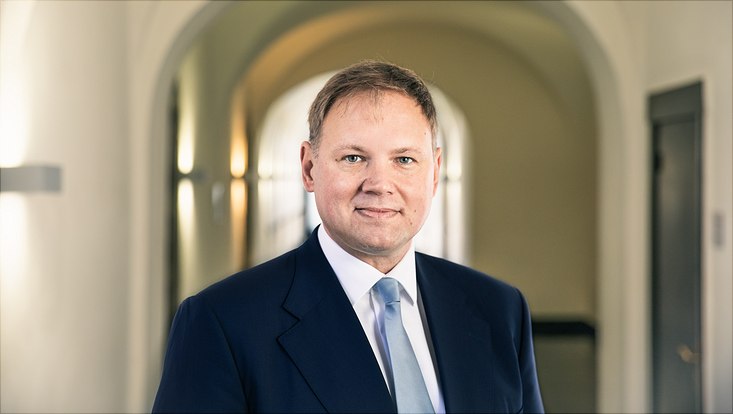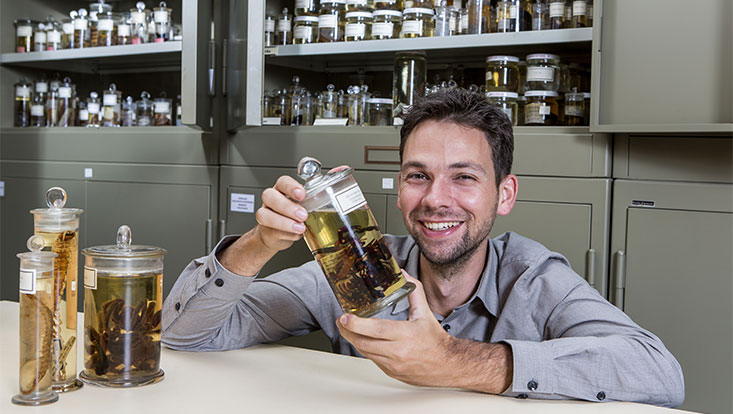Prof. Dr. Hauke Heekeren, Universität Hamburgs new president“I have experienced university life from many perspectives.”
1 March 2022, by Jacinta Homans

Photo: UHH/Esfandiari
He is a newcomer to Universität Hamburg: Prof. Dr. Hauke Heekeren has taken up official duties as the University’s president. In this interview, he looks back at his time as a young university student and explains the measures he is planning to take in the areas of sustainability and climate protection.
Prof. Heekeren, you’ve moved from Berlin to Hamburg. There is a cliché about Hamburg, namely that not just the weather but the people can be chilly. What has your experience been so far?
Very good! I have often been to the city—and when the sun was shining—and in the last few weeks, I’ve been able to get to know it better. People have been very open and friendly.
You studied medicine—why?
When I was doing my civilian service, I worked in a hospital—on a pediatric ward and in neurosurgery. And because I’ve always liked to learn and I am very curious, I began to develop an interest in studying medicine. I realized quickly that medical studies are great and varied and because I really like to work and interact with others, it was the right field for me.
What are your memories of being a student?
It was a time of setting out on my own. It was about meeting new people, becoming more independent, learning a lot. I was fascinated by the lives of researchers who had studied at different universities and in different countries. I also wanted to do that, so I began in Münster, moved quickly to Munich, and took up the neurosciences. Then I moved on to Berlin, from there to Duisburg-Essen, and after a stay in the United States, I finally ended up in Berlin, where I was first a professor, then dean, and then vice president.
Did you have jobs while you were studying?
Yes, I always worked while studying, as an assistant or doing nursing duties at hospitals or taking on night and weekend shifts, and then later I worked as a research assistant in a research project. I have experienced university life from many perspectives.
For many years, you did research at the crossroads of medicine and the neurosciences. What fascinated you about that?
During my medical studies I had already been very interested in psychology. Around 1992/93, there was something of a revolution in the neurosciences. For the first time, we could see the workings of the brain using magnet resonance imaging. I found this gripping: the possibility of observing and analyzing processes in real-time using MRI and other methods. This turned into a doctoral thesis and the field has very much shaped my life as a researcher. Questions such as: How do we actually make decisions—what happens in our brains?
You were a passionate researcher. How did you end up becoming a university administrator?
I took on leadership positions very early and I am very grateful to my mentors for giving me these opportunities. This had already started at the Charité in Berlin and after I returned from the United States, I was granted an Emmy-Noether Group, I led a research group at a Max Planck Institute, and in 2009 I became the deputy spokesperson for the cluster Languages of Emotion at the Freie Universität Berlin. That was really exciting because my colleagues hailed from over 20 different fields and came together to research the connections between emotions, language, art, culture, and society.
Then I became the vice dean, dean, and vice president for studies and teaching. I steadily gained leadership responsibilities. It developed organically. A few colleagues asked me: “What’s going on? Are you giving up on research?” and my answer was always “No, but my contribution to research will be different.” This is also my goal as president: to create the best possible conditions for research, studying, teaching, and work.
How do you envision your first 100 days as president of Universität Hamburg?
I would like to get to know the University in all of its facets better and to talk to teaching staff and researchers, administrative staff, and of course to students. I think it’s important to be a good listener. The work done here so far has been very good and it’s important to me to get an inside perspective on how Universität Hamburg works.
There are also a series of concrete topics that are especially important to me and that will naturally continue to be so after the first 100 days. Sustainability is one of those topics. It needs to become more visible and more broadly anchored in all areas of the University, meaning in teaching, research, and HR infrastructure.
And we need a concrete climate protection plan. This runs the gamut from general energy use to active climate and resource protection in our everyday university lives. In this context, it is also important to me to see what contribution universities can make to sustainability in society at large and what insights from the pandemic we can use in the future.
Another important goal is that the University continues to open up to the public and provide inspiration. I will be especially active and engaged in the areas of knowledge exchange and internationalization.
Internationalization is more vital than ever in times like these. A war in the middle of Europe, a war of aggression against the Ukraine – this is simply unacceptable. We concur with and support the federal government’s urgent appeal and the German Alliance of Science Organisation’s statement. Our thoughts go out to our partner institutions, colleagues, students and their families. Universities and academic institutions can and should build bridges worldwide and promote international understanding.
A newspaper article about you was headlined: “How can you lead a university without going mad?” What could that have meant?
I think the headline is alluding to the fact that Universität Hamburg is a very large university, and one with a tradition of political agitation and discourse. That is a good thing and important! In my view, discussion can very well be controversial. It is essential, however, that it is conducted with respect and objectivity.
I am looking very forward to my new position stewarding Univesität Hamburg together with the Executive University Board.


